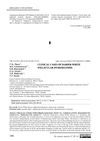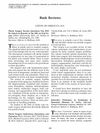 May 2024 in “Clinical Cosmetic and Investigational Dermatology”
May 2024 in “Clinical Cosmetic and Investigational Dermatology” Manipulating cell cleanup processes could help treat hair loss.
 April 2024 in “Frontiers in cellular and infection microbiology”
April 2024 in “Frontiers in cellular and infection microbiology” Blue light might help treat skin conditions by affecting the skin's bacteria.
 February 2024 in “Molecules/Molecules online/Molecules annual”
February 2024 in “Molecules/Molecules online/Molecules annual” NMN could potentially treat hair loss by reducing oxidative stress and improving cell health.

Nanocarriers with plant extracts show promise for safe and effective hair growth treatment.
 June 2023 in “Journal of multidisciplinary sciences”
June 2023 in “Journal of multidisciplinary sciences” PCOS may increase the risk of certain cancers.
 June 2023 in “Medical records-international medical journal”
June 2023 in “Medical records-international medical journal” Decreased IGF-1R expression may contribute to sacrococcygeal pilonidal sinus development.

The research identified key molecules that help hair matrix and dermal papilla cells communicate and influence hair growth in cashmere goats.
December 2022 in “Biochemical and Biophysical Research Communications” HtrA2 activity is crucial for normal hair growth by regulating fat cell development.
 November 2022 in “CARDIOMETRY”
November 2022 in “CARDIOMETRY” A group has developed therapies that show promise for treating cancer and various other conditions.
 October 2022 in “Medičnì perspektivi”
October 2022 in “Medičnì perspektivi” Darier-White disease causes skin and nail issues, starts around age 20, worsens until 40-50, and has poor treatment options.

No single biomarker is reliable enough for diagnosing and assessing SLE.
January 2020 in “Indian Journal of Pharmaceutical Sciences” Natural products show promise for new hair loss treatments.
 January 2019 in “Advances in stem cells and their niches”
January 2019 in “Advances in stem cells and their niches” Skin health and repair depend on the signals between skin stem cells and their surrounding cells.

Skin stem cells in hair follicles are important for touch sensation.

Hair follicle stem cells are crucial for touch sensation and proper nerve structure in mice.

OCT can effectively screen and diagnose various medical conditions non-invasively.
 January 2018 in “Stem cell biology and regenerative medicine”
January 2018 in “Stem cell biology and regenerative medicine” ATP-dependent chromatin remodeling is crucial for skin development and stem cell function.
 September 2014 in “Springer eBooks”
September 2014 in “Springer eBooks” Men and women experience skin aging differently due to changes in sex hormone levels with age.
 September 2014 in “Aktuelle Dermatologie”
September 2014 in “Aktuelle Dermatologie” The symposium concluded that environmental factors significantly contribute to skin aging.
 January 2009 in “Springer eBooks”
January 2009 in “Springer eBooks” The document concludes that managing skin conditions during pregnancy is important and requires specialized care.

The document concludes that Syndromes of Severe Insulin Resistance are rare disorders with limited treatment options.
 August 2003 in “International Journal of Cosmetic Surgery and Aesthetic Dermatology”
August 2003 in “International Journal of Cosmetic Surgery and Aesthetic Dermatology” The document recommends the reviewed medical books for professionals in cosmetic surgery, dermatology, and genetics.
 May 1991 in “Current problems in dermatology”
May 1991 in “Current problems in dermatology” Skin issues can indicate immune system problems.
November 2022 in “Regenerative Therapy” Advancements in tissue engineering show promise for hair follicle regeneration to treat hair loss.
 August 2016 in “InTech eBooks”
August 2016 in “InTech eBooks” Esthetic surgery complications can include infections, nerve injury, and more; proper evaluation and technique help prevent them.
 466 citations,
August 2004 in “Journal of the American Academy of Dermatology”
466 citations,
August 2004 in “Journal of the American Academy of Dermatology” Rosacea is a skin condition with unclear causes, classified into four subtypes.
 374 citations,
May 2016 in “The Lancet. Diabetes & endocrinology”
374 citations,
May 2016 in “The Lancet. Diabetes & endocrinology” Cushing's syndrome can cause serious health problems, and early treatment is crucial, but some issues may remain after treatment.
 247 citations,
August 2011 in “European Journal of Epidemiology”
247 citations,
August 2011 in “European Journal of Epidemiology” The Rotterdam Study updated its design and objectives in 2012, providing insights into various diseases in the elderly, including skin cancer, bone health, liver disease, neurological and psychiatric conditions, and respiratory issues.
 8 citations,
October 2022 in “Regenerative Therapy”
8 citations,
October 2022 in “Regenerative Therapy” New regenerative treatments for hair loss show promise but need more research for confirmation.
 3 citations,
January 2020 in “Clinical dermatology review”
3 citations,
January 2020 in “Clinical dermatology review” Trichoscopy is useful for diagnosing hair and scalp disorders in people with darker skin.



























